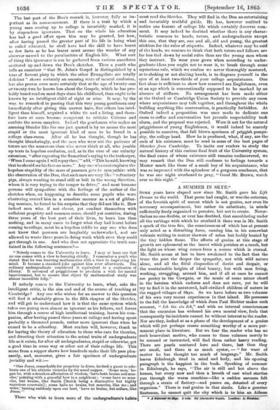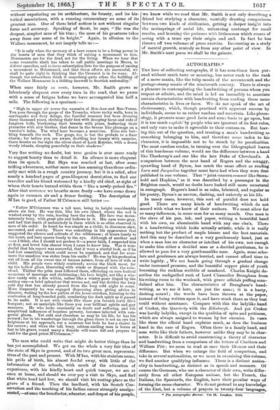A SUMMER IN SKYE.* SOME years have elapsed now since
Mr. Smith gave his Life Drama to the world. That poem had caught, or was the outcome, of the feverish spirit of unrest which is not genius, nor even its necessary accompaniment, but rather its substitute, in minds' sufficiently finely organized to perceive, but not to create. Never- theless no one doubts, or ever has doubted, that smouldering under all the verbiage with which he overlaid it there was in Mr. Smith a spark of the true fire, the consciousness of which has at present, only acted as a disturbing force, causing him in his somewhat volcanic writing to scatter showers of ashes but feeblyheated by the tiny hidden flame. The efforts of genius at this stage of growth are ephemeral as the insect which perishes at a touch, but the light on whose wing comes from a source which is eternal. Mr. Smith seems at last to have awakened to the fact that the truer the poet the deeper the sympathy, not with wild nature alone, and all the fitful rhapsodies of doubt and despair, or the unattainable heights of ideal beauty, but with men living, working, struggling, around him, and if all at once he cannot see poetry in the Cowgate, or the music of some minor chord in the heroism which endures and does not rave, yet he will try to find it in the untutored, half-civilized children of nature in the ragged villages of Skye. So we have before us two volumes of his own very recent experiences in that island. He possesses to the full the knowledge of which Jean Paul Richter makes such account, " lch bin ein Ich," and with an internal consciousness that the excursion has widened his own mental view, feels that consequently its incidents cannot be without interest to the reader. Nor are they, looked at as a phase of the development of a genius which will yet perhaps create something worthy of a more per- manent place in literature. But we fear the reader who has no such benevolent motive, who comes to these volumes merely to be amused or instructed, will find them rather heavy reading, There are pearls scattered here and there, bat then they are small, and there is so much oyster, — " for want of matter he has thought too much of language." Mr. Smith. leaves Edinburgh tired in mind and body, and his opening paragraph is the happiest in the book. Speaking of summer in Edinburgh, he says, " The air is still and hot above the houses, but every now and then a breath of east wind startles you through the warm sunshine—like a sudden sarcasm felt through a strain of flattery—and passes on, detested of every organism." There is real genius in that simile. Like a genuine Scotsman, he cannot quit the city which is to him an Athens it 81intmet. Ware. 2 vole. By stexauder Smith. London: A. Scraban.
without expatiating on its architecture, its beauty, and its his- torical associations, with a running commentary on some of its greatest men. One of these brief notices is not without singular force and accuracy. Speaking of Scott, he says, " He was the deepest, simplest man of his time ; the mass of his greatness takes away from our sense of its height." Again, in allusion to the Wallace monument, he not inaptly tells us
:- "It is only when the memory of a hero ceases to be a living power in the hearts of men that they think of raising a monument to him. Monuments are for the dead; not for the living. When we hear that some venerable sheik has taken to call public meetings in Mecca, to deliver speeches, and to issue subscription lists for the purpose of raising a monument to Mohammed, and that these efforts are successful, we shall be quite right in thinking that the Crescent is in its wane. Al- though the subscribers think it something quite other, the building of the Wallace Monument is a bidding farewell to Scottish nationality."
When once fairly en route, however, Mr. Smith grows so laboriously eloquent over every turn in the road, that we pause with a sense of fatigue before we have accompanied him half a mile. The following is a specimen :—
"High in upper air tower the summits of Ben-Ann and Ben-Venue. You pass through the gorge of the Trosachs, whose rocky walls, born in earthquake and fiery deluge, the fanciful summer has been dressing these thousand years, clothing their fest with drooping ferns and rods of foxglove bolls, blackening their breasts with pines, feathering their pinnacles with airy birches, that dance in the breeze like plumage on a warrior's helm. The wind here becomes a musician. Echo sits bab- bling beneath the rock. The gorge, too, is but the prelude to a finer charm ; for before you are aware, doubling her beauty with surprise, there breaks on the sight the silver sheet of Loch 'latrine, with a dozen woody islands, sleeping peacefully on their shadows."
Very fine writing no doubt, but true genius is ever more ready to suggest beauty than to detail it. Its silence is more eloquent than its speech. But Skye was reached at last, after some trifling adventures, neither more nor less amusing than those ordin- arily met with in a rough country journey, but it is a relief, after nearly a hundred pages of grandiloquent deseri?tion, to find our traveller and his friend welcomed by a kindly old chief, at sight of whom their hearts burned within them " like a newly-poked fire." After that sentence we breathe more freely—we have come down again to common air and a firmer footing. The description of M'Ian is good, of Father M'Crimmon still better :—
"Father M'Crimmon was a tall man, being in height considerably above six feet. He was thin, like his own island, where the soil is washed away by the rain, leaving bare the rock. His face was moan- tainotusly bony, with great pits and hollows in it. His eyes were grey, and had that depth of melancholy in them which is so often observed in men of his order. In heart he was simple as a child; in discourse slow, measured, and stately. There was something in his appearance that suggested the silence and solitude of the wilderness ; of hours lonely to the heart, and bare spaces lonely to the eye. Although of another and —as I think, else I should not profess it—a purer faith, I respected him at first and loved him almost when I came to know him. Was it won- derful that his aspect was sorrowful, that it wore a wistful look, as if he had lost something which could never be regained, and that for ever- more the sunshine was stolen from his smile ? He was by his profession cut off from all the sweet ties of human nature, from all love of wife or child. His people were widely scattered; across the black moor, far up the hollow glens, blustering with winds or dimmed with the rain- cloud. Thither the grim man followed them, officiating on rare festival occasions of marriage and christening ; his face bright, not liko a win- dow ruddy with a fire within, rather like a wintry.pane tinged by the setting sun—a brief splendour that warms not, and but divides the long cold day that has already passed from the long cold night to come. More frequently he was engaged dispensing alms, giving advice in disaster, waiting by the low pallets of the fever-stricken, listening to the confession of long-hoarded guilt, comforting the dark spirit as it passed to its audit. It is not with viands like these you furnish forth life's banquet ; not on materials like these you rear brilliant spirits and gay manners. He who looks constantly on death and suffering, and the unspiritual influences of hopeless poverty, becomes infected with con- genial gloom. Yet cold and cheerless as may be his life, he has his reward; for in his wanderings through the glens there is not an eye but brightens at his approach, not a mourner but feels he has a sharer in his sorrow ; and when the tall, bony, seldom-smiling man is borne at last to his grave, round many a fireside will tears fall and prayers be said for the good priest M'Crimmon."
The man who could write that might do better things than he has yet accomplished. We get on the whole a very fair idea of the state of Skye in general, and of its two great men, representa- tives of the past and present. With M'Ian, with his stainless name, his pride of birth, his almost feudal sway, with little of the information of the schools, with much of the education of experience, with his kindly heart and quick temper, we are at once at home, and should we ever pay a visit to Skye, and find that white head laid low, we should visit his resting-place as the grave of a friend. Then the landlord, with his Scotch Con- servatism and the teaching of his Indian career strangely amalga- mated,—at once the benefactor, educator. and despot of his people, we know while we read that Mr. Smith is not only describing a friend but studying a character, mentally drawing comparisons between two kinds of civilization, getting a deeper insight into the mainsprings of social life, unlearning contempt for small results, and learning the patience with littlenesses which comes of seeing with a truer eye their origin and end. In fact be has thrown off two volumes of prose exercise. Interesting as a study of mental growth, scarcely so from any other point of view. In Mr. Smith's next poem we shall be the gainers.































 Previous page
Previous page